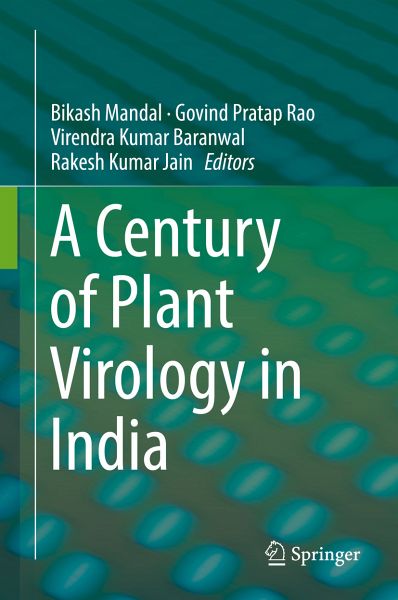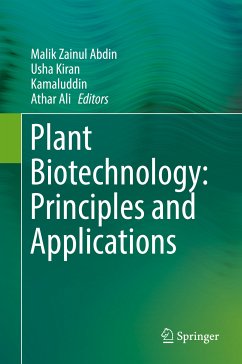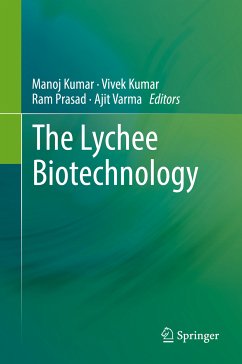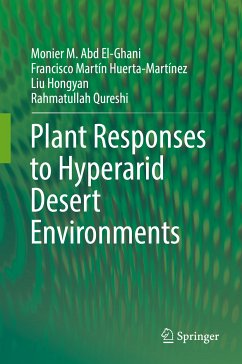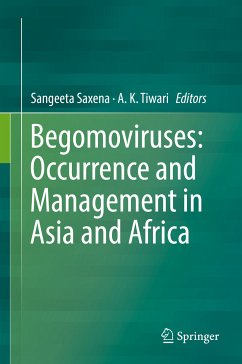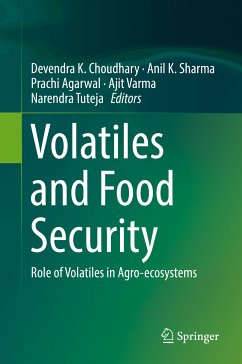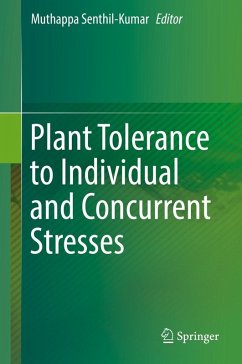Dr. Bikash Mandal is a Principal Scientist in the Advanced Centre for Plant Virology, Division of Plant Pathology, Indian Agricultural Research Institute (IARI), New Delhi. His major research areas are molecular characterization of plant viruses, diagnosis and application of plant virus genome as useful genetic resource. Dr. Mandal has a total of 86 peer-reviewed research papers in the national and international journals and two patents. He is a Fellow of Indian Virological Society and Indian Phytopathological Society, National Academy of Biological Science and a member of The National Academy of Sciences, Allahabad, India. He is a member in the Study Group on Nanoviridae of the International Committee on Taxonomy of Viruses. Dr. Mandal is the Editor-in-Chief of "VirusDisease", an international journal on Virology, which is published through Springer. Dr. Mandal teaches Plant Virology and guides master and PhD students at IARI, New Delhi. His major contribution is in developingtechnologies for diagnosis of plant viruses that are important in Indian agriculture. During last 23 years, Dr. Mandal characterised as many as 24 different plant viruses belonging to 10 genera and generated genome sequence resources, which were utilised to design molecular tools to generate recombinant antigens and antibodies. Dr. Mandal has developed several prototypes of diagnostic kits. Currently, Dr. Mandal's Lab has initiated work on developing plant virus genome based expression vector and virus induced gene silencing vector. Dr Govind Pratap Rao is working as a Principal Scientist (Plant Pathology) at Indian Agricultural Research Institute, New Delhi. Dr Rao has 29 years of research experience on plant pathology especially on plant virology and phytoplasmas. He did significant contributions in characterization of viruses infecting cucurbits, sugarcane, maize and sorghum viruses. He also developed polyclonal antibodies against Sugarcane mosaic virus, Sugarcane streak mosaic virus, Sugarcane yellow leaf virus, Maize dwarf mosaic virus and Rice tungro bacilliform and Rice tungro spherical viruses. He has published over 130 research publications and authored and edited nearly 17 books to his credit. He has also guided 3 MSc and 11 PhD students on different aspects of plant pathology. He has been worked in different capacities as Scientific Officer, Sr Scientific Officer (Pl Pathology), Head , Div Plant Pathology and Officer-in-Charge at Research Stations of UP Council of Sugarcane Research centres at Seorahi, Gorakhpur and Shahjahanpur from 1987 to 2010. He has been awarded several prestigious awards to his credit. The most important ones are : National Biotechnology Associateship Award (1991-1992), DBT, Govt. of India; Young Scientist Award (1994-1995) from DST, Govt. of India; Overseas BOYSCAST Award (1996) from DST, Govt. of India; President Award, Society for General Microbiology, UK, 1998; Best U.P. Agriculture Scientist Award (UPCAR) ,Govt of Uttar Pradesh in 2002; Vigyan Ratna Award by CST, Govt. of UP for the year 2003-2004; Jin Xiu Qiu Award in 2006 by People's Govt of Guangxi Province, Nanning, China, Global Award of Excellence, IS 2008, Al-Ahrish, Egypt and Dr. Ram Badan Singh Vishisht Krishi Vaigyanik Puraskar-2014 by UPCAR, Lucknow, India. Dr. Rao is Editor-in-Chiefs of Sugar Tech , an international journal of sugar crops and related industries, and Phytopathogenic Mollicutes, an international journal of phloem limited microrganisms. Dr Rao is also Secretary General of Indian Virological Society, New Delhi and member of several prestigious scientific societies and organizations like, APS,USA; ASM, USA; ISSCT, Mauritius, IPWG, Italy, SSRP, New Delhi and IPS, New Delhi. Besides, Dr Rao has visited 27 countries as visiting scientists, for invited talk, postdoc fellow, research training, panel discussion and for attending workshop and conferences. At present Dr. Rao is working on characterization, epidemiology and management of viruses infected cereal crops, millets and maize and phytoplasmas infecting important agriculture crops in India. Dr. Virendra Kumar Baranwal is a Professor of Plant Pathology at the Division of Plant Pathology, Indian Agricultural Research Institute (IARI), New Delhi. He teaches post graduate courses in Plant Pathology and has guided 3 M.Sc. and 7 Ph.D. students at IARI. He has led several externally funded projects on genomics and diagnostics of plant viruses and has published more than 90 research papers in peer reviewed journals. He is a Fellow of National Academy of Agricultural Sciences and National Academy of Sciences India. His research group has made significant contribution on the characterization, diagnostics and evolutionary relationship of badnaviruses infecting banana, citrus and sugarcane and determined the immunodominant region in N terminal of coat protein that led to development of coat protein construct and synthetic peptide for production of polyclonal antibodies against a badnavirus infecting banana. His group developed a partial dimer construct of banana badnavirus which caused infection in banana when co-inoculated with viral suppressors. His group identified and characterized for the first time in India, amploviruses associated with grapevine and developed diagnostic reagents. He demonstrated occurrence of new isolates of whitefly transmitted carlavirus in legume crops using next generation sequencing. He led a group which demonstrated multiplex RT-PCR for simultaneous detection of multiple virus infection caused by carla- poty- and allexiviruses in allium crops and for mixed infection of different viruses and greening bacterium in citrus. His latest contribution includes development of RPA based PCR detection of banana bunchy top virus using crude extract and without the use of thermal cycler. Development of novel protocol of virus elimination in garlic using solar therapy coupled with apical meristem developed by his team will help improve garlic yield. Development of micro array chip having probe sets for more than 1100 viruses at genus and species level and 40 viroids is another contribution made by his group. Dr. R.K. Jain is presently Dean & Joint Director (Education) at IARI, New Delhi. He did his Post Doctorate from CSIRO, Melbourne, Australia; University of Florida, Gainesville, and University of Georgia, Tifton, USA. As a Plant Virologist, his research canvass includes emerging plant viruses such as tobacco streak virus affecting sunflower and groundnut, papaya ringspot virus affecting papaya, groundnut bud necrosis virus affecting tomato and watermelon bud necrosis virus affecting cucurbits with reference to their distribution profile and genetic diversity, development of diagnostics and virus resistant transgenic plants (VRTPs). He has guided several M.Sc. and Ph.D. students. Besides, hehas hosted Scientists from Australia, Bangladesh, Spain, UK and USA in his laboratory. He is the Fellow of National Academy of Agricultural Sciences; Indian Phytopathological Society and Indian Virological Society.
